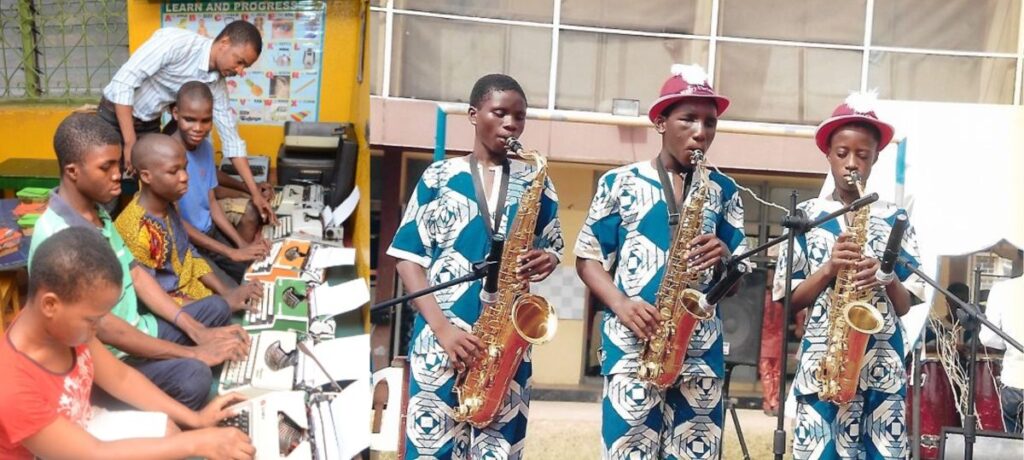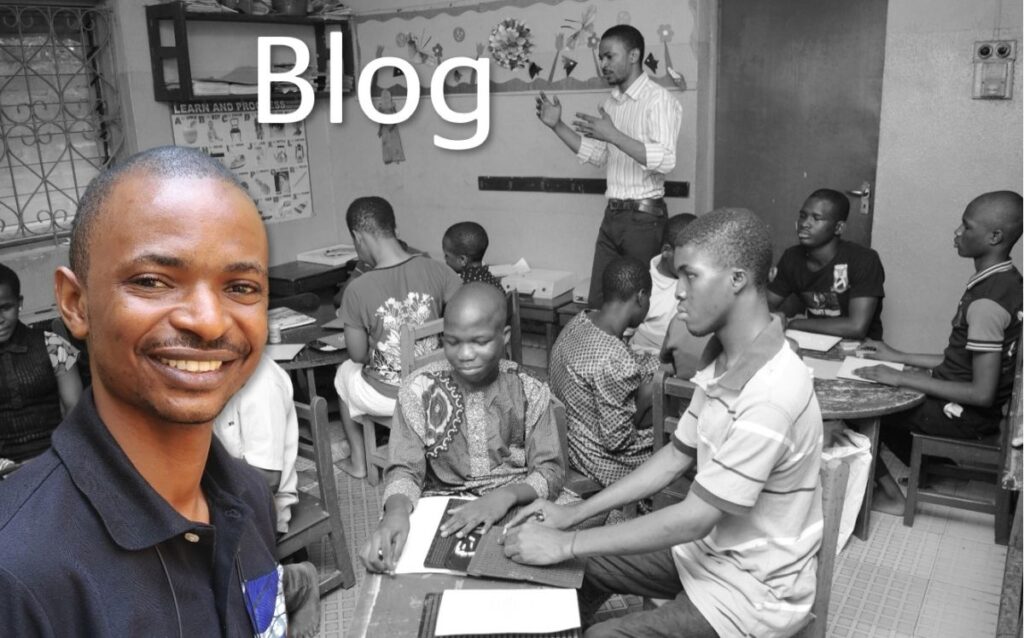Trauma to purpose – Paving the Way for Inclusive Early Childhood Education
A fatal bus accident had caused his eyes to be temporarily blind for two months. This gave him a glimpse into what it feels like to be visually impaired.
The experience formed Olakunle Joshua’s passion for special education. The training he had and the experiences he gained in the years of working with the blind and deaf resulted in the dream and passion to start an early childhood centre for visually impaired children. At “Swing High!”, he will empower little children to have a dynamic start into life.
By Joshua Olakunle
A Life-Altering Bus Accident
I can still hear the very long and loud screeching of the tyre. The driver had lost control of the steering. In the blink of an eye, the bus took flight across the expressway. It felt as if we were bouncing like a chick learning to fly. I became unconscious. I still don’t any recollection beyond that moment. When I opened my eyes, we were still inside the bus but way off the highway, blood everywhere, the bus crushed beyond recognition. What was supposed to be a simple trip from college to my eagerly waiting family turned my life upside down.
The Collision That Changed My Life
My dream was to become a medical doctor and being in college was supposed to be exciting but I had mixed feelings, since I knew how difficult it would be for my parents to financially support me. The bus accident had put an end to my dream. Not long after, I became very sick and I was completely blind for about two months.
This experience gave me a glimpse into a life of a visually impaired person. I felt insecure and dependent on everybody around me. I could not select the kind of clothes I wanted. I was not able to see the food I was eating. I couldn’t enjoy my favourite movies and go about my regular daily activities without a guide who walked with me.
Turning Trauma into Purpose- Inclusive Early Childhood Education
Looking back, I see the accident now as a turning point. Worried that I would never be able to see again, a number of questions ran through my head, and I was curious: do all people who become blind experience what I experienced? At this point it felt horrible that some people had to go through this permanently, while I just suffered from temporary blindness. This gave me the urge to be impactful in their lives.
Later on, I got to know persons who could cope with these challenges very well, blind people who are making their choices, being in leadership positions and have a life full of adventure. But not everyone has the chance to follow that path; to be empowered. Interested in learning more, I switched from medicine to special education with the focus on visual impairment. Here I learnt a lot about braille, mobility, and orientation but I also ventured out to study sign language. I gained many hearing-impaired friends and they told me about the struggles they faced visiting hospitals or taking the bus. Imagine a world where they could communicate with everyone on the street!
Evolution to Special Education
Before going to college, if someone had asked me what I wished for children with disabilities, I would have probably answered: “I wish for a miracle for them to be healed.” Initially, at the beginning of this whole experience, it was all about pity and sympathy, but after my training at the college it became a matter of empathy and empowerment. After I graduated, I got a job in a blind school in Lagos and have volunteered to work in various special schools, including a school for the hearing impaired, organizations working for people with down syndrome, and autism and cerebral palsy centres.

Samson’s Journey to Independence
During my work as a special teacher, I met Samson who, back then, was 12 years old. When he became blind at the age of 2, he was locked inside a room for over ten years. His single mother explained that she couldn’t find a school that would accept him. I was shocked to see that he was only able to crawl on the floor. No-one had taught him how to walk. After three years of physiotherapy, he was able to stand and walk by himself, but he was never walking confidently.
Swing High’s Vision for Visually Impaired Children
Lack of early childhood education can hinder visually impaired children to develop like any other child. Therefore, I imagine an exciting start of life in a learning space with an adventurous garden with trees and rocks to climb on, with a mini swimming pond, with swings in different shapes, slides and a seesaw, tree trunks to balance on, branches to build huts and caves to hide away, different animal modelled structures, obstacle courses, lawns for ball games, a little theatre for plays and fashion shows, various musical instruments to experiment, spaces for mud, and sand to construct dream castles, and the list goes on! Isn’t that a place where everyone would want to send their child to?
Transforming Perspectives: Inclusion Beyond Charity
Seeing our children, regular educational institutions will be delighted to accept them because they instantly understand that these children are no longer just objects of charity but an asset to any classroom.
Read more blogposts here
Did you miss the kanthari TALKS? No problem: watch them here



